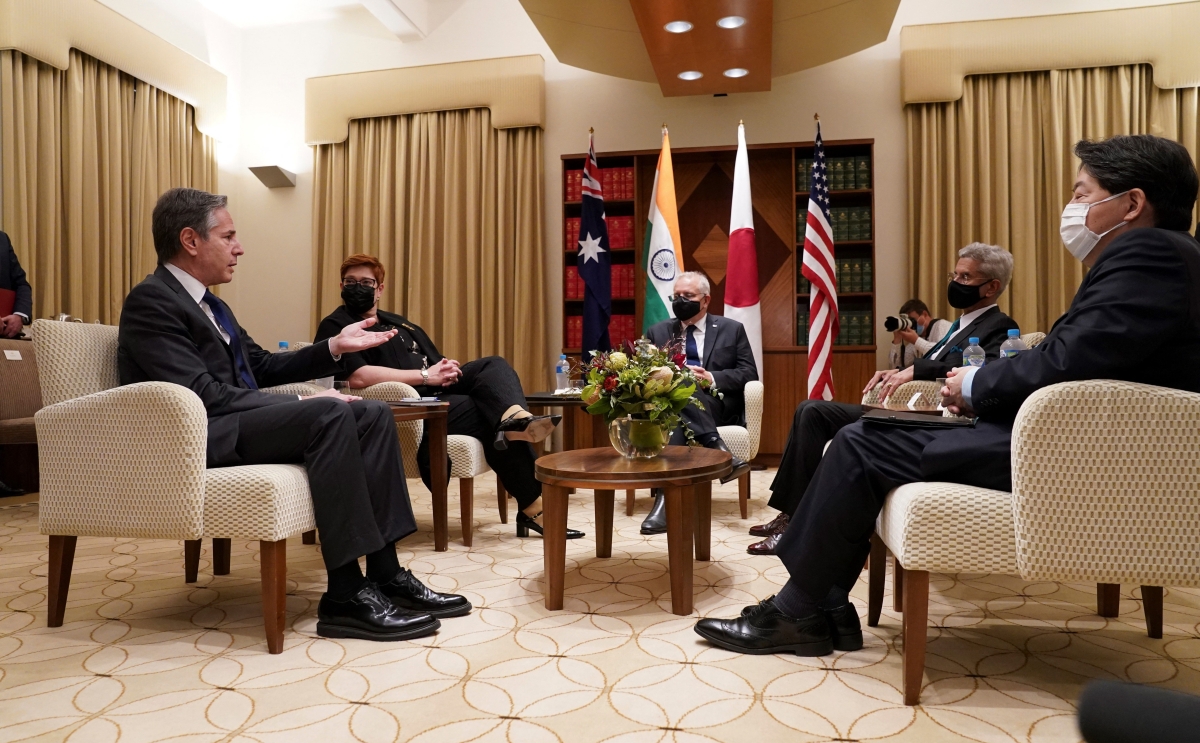
Never positive, China’s views of the Quad have shifted over time from dismissive to derogatory to damning. But beyond a focus on this harsh rhetoric, it is important to understand what the Quad symbolizes within Beijing’s worldview and why that portends a more contested relationship between the Quad and China in the future.
When the Quad was still in its formative stages and struggling to find coherence and relevance, China’s Foreign Minister, Wang Yi, memorably scorned the group in 2018 as mere “sea foam in the Pacific or Indian Ocean” that would “soon ... dissipate.” Less disdainful two years later, Wang portrayed the Quad as an effort to build “an Indo-Pacific version of NATO.” More recently, Chinese Foreign Ministry spokespersons have likened high-level Quad meetings to “exclusionary blocs” and warned that “[b]uilding small cliques and stoking bloc confrontation is the real threat to a peaceful, stable and cooperative maritime order.”
Although this year’s Quad Leadership Summit in Sydney will not take place, we should nevertheless expect more of the same from Beijing if and as the Quad continues to gain momentum as an effective global and regional actor.
But for China, there is more to countering the Quad than bombast. For China’s leaders, the Quad forms part of a larger set of security and political challenges that it confronts on the international scene.
Since its founding in 1949, the People’s Republic of China (PRC) has never been comfortable with the presence of alliances or other security partnerships on its periphery. That is certainly true of U.S.-led alliances and other security pacts, which are the constant object of Chinese criticism, wedge tactics, and threats. While the Quad is far from a formal alliance, Beijing understands that the group shares a deep concern with China’s growing role in the Indo-Pacific and beyond and that it has the potential — if not the tacit intention — to impede China’s rise.
When Chinese President Xi Jinping openly condemned “U.S.-led Western countries” for seeking to “contain, encircle, and suppress China” in a recent speech to Chinese leaders, he no doubt had in mind the U.S. alliance system in the Indo-Pacific, the AUKUS (Australia–United Kingdom–United States) pact, as well as the Quad.
Moreover, Beijing understands that the Quad’s overarching objectives — especially its “commitment to a free and open Indo-Pacific that is inclusive and resilient” — implicitly take issue with China’s authoritarian form of governance and seek to push back against its ambitions and interests in the region and beyond. Therefore, in China’s eyes, the Quad is part of the broader political and ideological challenge facing Beijing, especially in its relations with more open, liberal, and democratic societies around the globe.
In short, in China’s view, the Quad has increasingly come to represent much of what is wrong with the world.
Looking ahead, it is likely Beijing will negatively compare the mission and aims of the Quad with Chinese undertakings in the Indo-Pacific and in the Global South more broadly. While the Quad will be disparaged for its hegemonic intentions, in contrast, Beijing will cast its own forms of China-led multilateralism — such as the Shanghai Cooperation Organization; the Forum on China-Africa Cooperation; the China–Arab States Summit; the China–Central Asia Summit; the China–Horn of Africa Peace, Governance and Development Conference; and many others — as “inclusive”, “win-win,” and “mutually beneficial,” as well as proof positive debunking the “China threat” narrative.
More broadly, we can expect the Quad and other “Western” and/or U.S.-supported security frameworks to be disapprovingly compared with China’s recently launched Global Security Initiative (GSI).
Announced by Xi Jinping in April 2022 and elaborated in a PRC Foreign Ministry concept paper in February 2023, the GSI is increasingly featured in China’s official declarations and in bilateral and multilateral statements with other parties. It is touted by PRC officialdom as a new framework to eliminate sources of conflict, strengthen global security governance mechanisms, and achieve sustainable peace and development. Most recently, the GSI was credited for the success of the Beijing-brokered resumption of diplomatic ties between Iran and Saudi Arabia. On the other hand, in the Chinese telling, frameworks such as the Quad — unlike the GSI — need to eschew “power politics,” “bloc confrontation,” “hegemonism,” and “Cold War thinking.”
In the face of greater coherence and pushback among U.S. allies and security partners, and entering a period of far greater competition and contestation with those powers, China is pushing back, competing and contesting in ways of its own. In recognizing these challenges, Xi Jinping has repeatedly called on the Chinese Communist Party and the Chinese people to surmount them by “daring to struggle” and “daring to win.” As the Quad gains strength, it will be increasingly seen in Beijing as a critical player in that larger contest for the future.
No comments:
Post a Comment